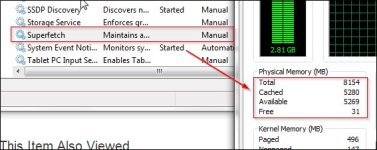The 'Cached' value in task manager is the sum of what is known as the standby and modified page lists. Pages of memory on the modified page list need to be written to disk before they can be given to another process, and therefore, do not contribute to 'Available' memory. Pages on the standby page list on the other hand can immediately be given to another process because that code or data is already located on disk somewhere and can simply be read back into memory if necessary.
While the 'Cached' value is the sum of both of those lists mentioned above, the vast majority of that memory will most likely be on the standby page list. In fact, in your case, because the 'Cached' and the 'Available' value are so similar, and the fact that the 'Free' value is a mere 31MB, it's reasonable to conclude most of what has been cached is on the standby page list. This is a very good thing.
Before Windows Vista, Windows was much more reactive in terms of managing physical memory, and the standby list would generally be populated in a reactive manner. When pages are dropped from a process working set because they are not being accessed actively, those pages will be moved to the standby page list, assuming it already resides on disk somewhere. If a page is dropped from a working set and hasn't been written to disk, it will be moved to the modified page list. If the original process doesn't reference the page, it will eventually be written to disk and then subsequently moved to the standby page list. Also, when a process exits, pages containing code, such as exe's and dll's, will be placed on the standby page list.
Disabling Superfetch will have no impact on the above. Superfetch is a feature which enables the system to act in a much more intelligent way and allows data and code to be pro-actively put into memory. If there are pages of memory on the standby page list which are ejected because of some other process, Superfetch can bring most if not all of it back into memory from disk before you may even need it again. Disabling the Superfetch service will just make the system a lot less efficient.




